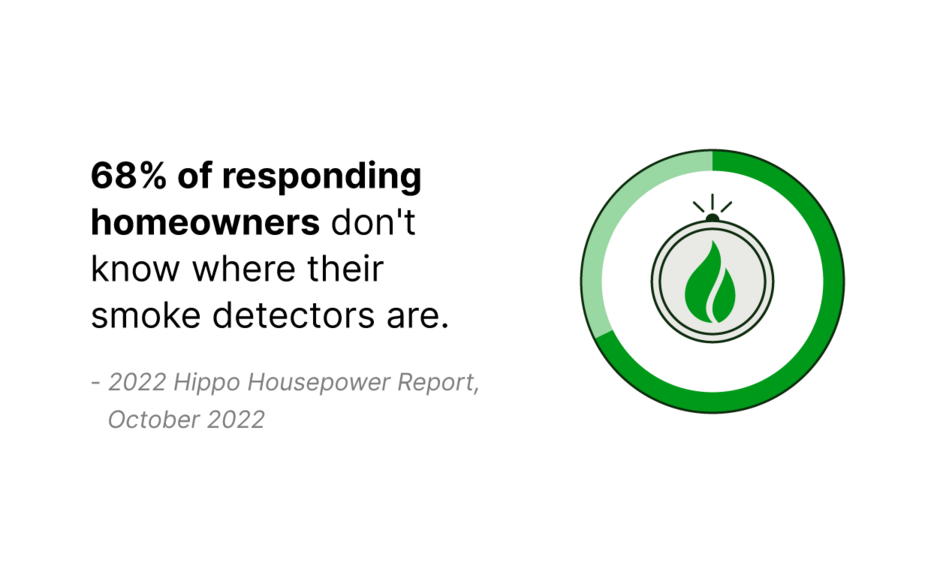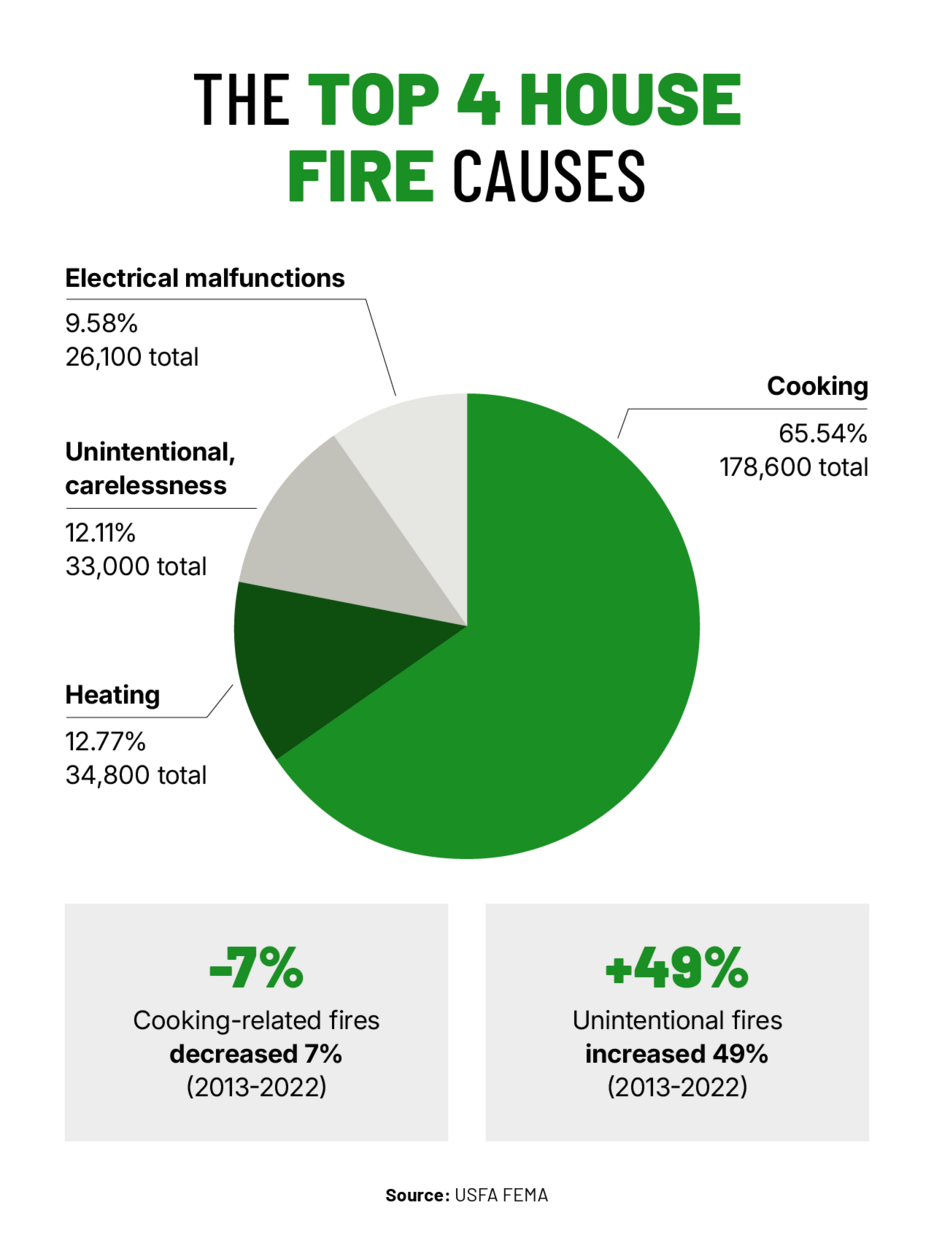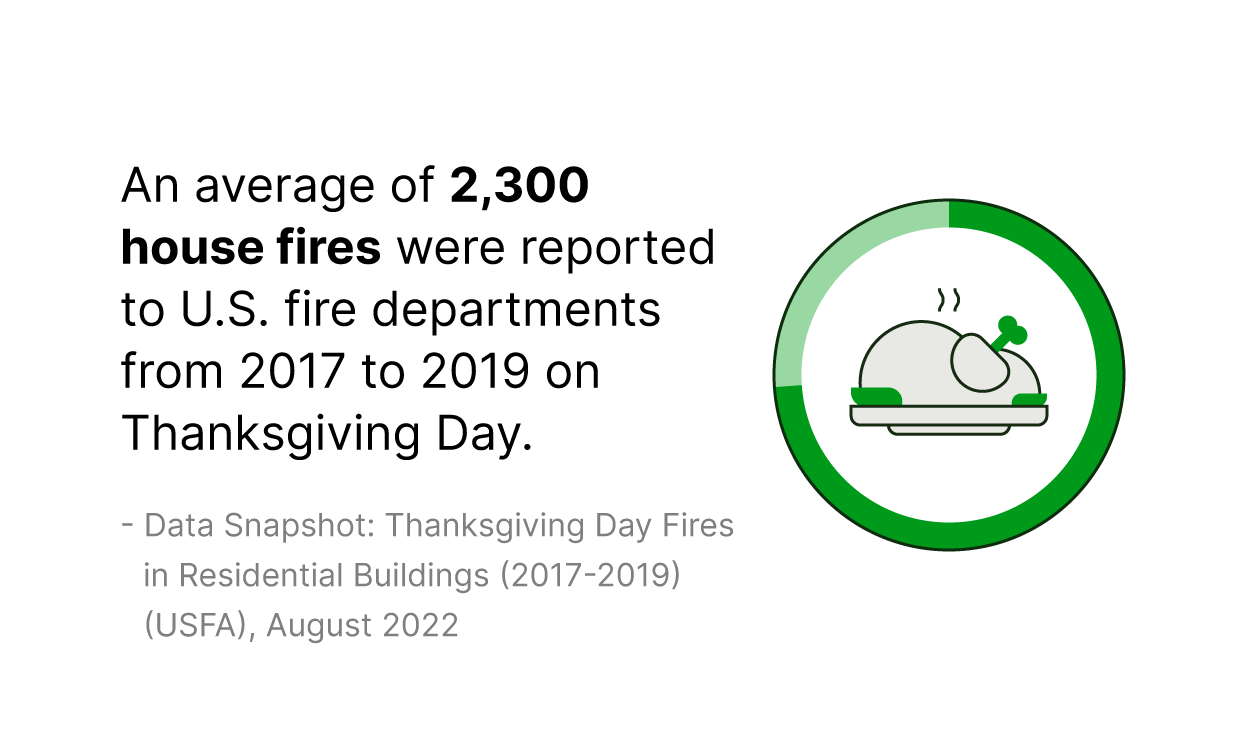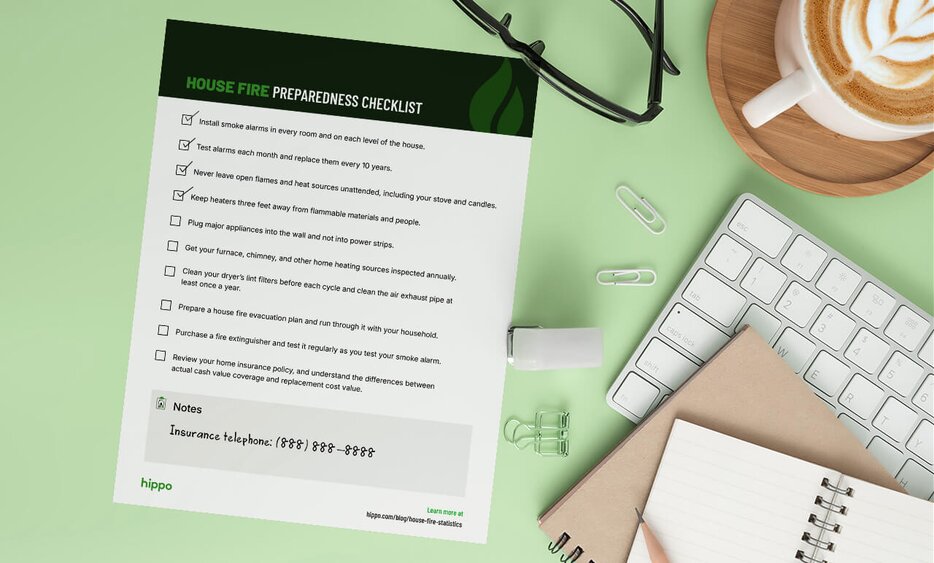27 U.S. House Fire Statistics + Tips to Help Protect Your Home [2024]

Fire is a year round concern for homeowners that want to protect their families, property, and valuables from disaster.
House fires occur more commonly during cooler months, beginning in November according to the National Fire Protection Association’s (NFPA) from April 2023. That doesn’t mean summer months aren’t a concern, as drought and extreme heat caused over 24,000 wildfires between June and August in 2023—peak wildfire season in the U.S.
Luckily, most homeowners can help prevent house fires with a proactive approach to protecting the home. To help you prevent fires, we’ve compiled a list of house fire statistics and causes that can help you inform your household of the risk and understand what steps you can take to help prepare.
Key takeaways
- There were over 374,300 U.S. residential fires in 2022, causing $10.8 million in damage loss. (USFA)
- Cooking led to an estimated average of 158,400 home fires each year from 2017 to 2021. (NFPA)
- 68% of responding homeowners in 2022 don't know where their smoke detectors are. (Hippo)
- An estimated 33,000 fires in 2022 were caused unintentionally or due to carelessness. (USFA)
- A home fire occurred in the United States every 93 seconds in 2021. (NFPA)
Are homeowners prepared for a house fire?
Preparedness is essential to preventing house fires. Emergency plans and smoke detectors are two important tools that can help minimize the impact of a house fire. Let’s look at how homeowners are currently approaching house fire preparedness:
54% of responding homeowners in 2023 plan to check and replace batteries in smoke and carbon monoxide detectors to prepare for extreme weather this year. (Hippo)
- 32% of responding homeowners in 2023 planned to inspect fire extinguishers to prepare for extreme weather this year. (Hippo)
- 25% of responding Americans in 2021 didn’t have a fire extinguisher in their home. (ValuePenguin Survey)
- Between 2018 to 2022, 74% of homes that experienced a house fire had a smoke alarm, and 59% of home fire deaths occurred in homes without an alarm. (NFPA)
- A survey found that 95% of homes have a smoke alarm, though it’s estimated that closer to 92% actually utilize their alarms. (NFPA)
- 21% of responding Americans in 2023 who live in wildfire-prone areas have made an emergency plan. (FEMA)
Preventive actions to take:
-
Ensure you have smoke alarms on each floor, inside everyone’s bedroom, and at least 10 feet away from kitchen appliances.
-
Test each smoke alarm at least every month and replace batteries at least every year.
-
Get a fire extinguisher for your home and test it at least once a month. Check that the pressure gauge is operable, hold the extinguisher to confirm it’s full, and complete a visual inspection for damage or corrosion.
-
Create a map of your home that identifies all windows and doors and at least two exits for each room.

Source: 2022 Hippo Housepower Report, October 2022
When do house fires occur?
House fires can happen fast and, according to the NFPA, are more likely to start in the evening and during cooler months. Knowing peak times can help homeowners understand common risks and how to prevent them.
- 46% of home structure fires happened between November and March from 2016 to 2020. (NFPA)
- 55% of home fire deaths occurred from November to March from 2016 to 2020. (NFPA)
- Most home fires occurred between 5 p.m. and 8 p.m. from 2016 to 2020 (NFPA)
- Once a fire starts, occupants have as little as two minutes to get out of the house safely. (NFPA)
We know that housefires ramp up during the busy holiday months, as the temperatures cool and people turn up their heaters. Keep a close eye on heat sources when they’re on, as well as their placement and maintenance.
Preventive actions to take:
-
Inspect space heaters before using them, keep them at least three feet away from people and flammable objects, and plug them directly into the wall.
Practice an emergency evacuation plan with the whole family (including pets) to ensure everyone knows how to exit quickly and safely.
Don’t leave any heat sources unattended when you’re winding down at the end of the day or going to bed. Heat sources can include candles, fireplaces, and stoves.
What causes house fires?
The top five causes of house fires in 2016-2020 are cooking, heating equipment, electrical distribution and lighting equipment, intentional fire setting, and smoking materials like tobacco products, according to the NFPA.
Though you might not think anything of it, simply leaving a pile of laundry next to a space heater could lead to a house fire. Learn more about common causes of home structure fires and how to help prevent them.
- Cooking led to an estimated average of 158,400 home fires each year from 2017 to 2021. (NFPA)
- Over a quarter (29%) of home cooking fires include unattended equipment as a factor, and 53% of home cooking fires involve a stovetop or range. (NFPA)
- Lighting equipment and electrical distribution caused an average of 30,740 fires annually from 2016 to 2020. This includes fires started by dryers, heating equipment, and air conditioners. (NFPA)
- Smoking materials cause an average of 15,900 fires each year from 2016 to 2020. Smoking materials include cigarettes, cigars, and pipes. (NFPA)
- An estimated 33,000 fires in 2022 were caused unintentionally or due to carelessness. (USFA)
- 15% of U.S. homeowners report experiencing a climate-related fire risk in the last 12 months, and 11% actually had issues with fire damage. (Hippo)
Familiarize yourself with common hot spots for house fires and make sure you prioritize helpful devices that quickly detect or prevent fires from spreading, like a smoke alarm and fire extinguisher. Work on these good safety habits with your family to prevent a fire from getting out of control.
Preventive actions to take:
-
Don’t leave the stove unattended. Turn it off if you need to walk away.
Turn the pan handles toward the back of the stove to avoid accidental bumps.
Keep flammable materials, like oven mitts or rags, away from the stove.
Address electrical issues as soon as possible to help avoid potential fires. Issues can include loose outlets, flickering lights, or outlets or wires that smell like they’re burning.
Smoke outside and ensure cigarettes and ashes are fully out before tossing them.

Holiday dinners increase fire risk

- Keep kids and pets away from the kitchen, especially during the holidays to avoid accidents.
- Place candles at least one foot away from anything that can catch fire and away from spots where people can accidentally knock them over.
- Keep the surrounding three feet around your Christmas tree clear of heat sources that can accidentally ignite your tree.
- Throw away faulty holiday lights, avoid using more lights than directed by the manufacturer, and turn them off before going to bed.
Annual house fire statistics and losses
A house fire can be a costly and scary event for any homeowner. Exactly how much damage depends on the scale and the severity of the fire. Reviewing your home insurance policy and keeping your coverage up-to-date can help limit the financial impact of a house fire.
- U.S. fire departments handled about 350,800 house fires each year from 2016 to 2020. (NFPA)
- House fires resulted in more than $7.3 billion worth of direct property damage, 11,320 civilian injuries, and 2,708 civilian deaths on average each year from 2016 to 2020. (NFPA)
- Cooking was the primary cause of home fires (49%) and related injuries (41%) from 2016 to 2020. (NFPA)
- While smoking materials, like tobacco products, only account for 5% of home fire causes, they were the leading cause of home fire deaths (24%) from 2016 to 2020. (NFPA)
- From 2015 to 2019, 37% of home fire deaths are those 65 years old and above. (NFPA)
Thousands of house fires occur each year, causing billions in damage and unimaginable losses for families. Understand the risk of residential fires, prepare with home insurance and preventative actions to protect your home .
Preventive actions to take:
- Understand what your homeowners insurance covers in the event of a fire and whether you need more fire insurance to cover potential risks.
- Schedule a professional inspection if you suspect issues with your home electrical system.
- Designate areas outside for smoking and use a sturdy ashtray that won’t easily fall over.
- Complete a home inventory to keep track of your personal losses if a home fire does occur.
- Create a plan with family members or neighbors if you or another older adult needs help escaping during a fire.
When does home insurance cover fires?
Basic home insurance policies typically cover dwelling, personal property, and personal liability when house fires occur.
Dwelling coverage, in particular, provides coverage for structures on your property if a covered blaze damages them. Personal property coverage will cover your belongings in the event of a covered loss, so you can focus primarily on getting out of the house.
Preparing yourself and your home for house fires can help lower your risk and a future fire’s impact. Creating a fire escape route is an excellent first step, along with investing in home care to help you prevent any losses due to a fire.
You can also download the Hippo Home app (available on the Apple App Store and Google Play Store) to get personalized seasonal maintenance checklists tailored to your home—just another way Hippo has your back.
Downloadable house fire preparedness checklist
Familiarizing yourselves with the dangers of house fires is one step in house fire preparedness. Next, you can start making fixes and changes around your home to lessen your house fire risk. Download our checklist below for some tips to get you started and learn more safety tips from the NFPA.




